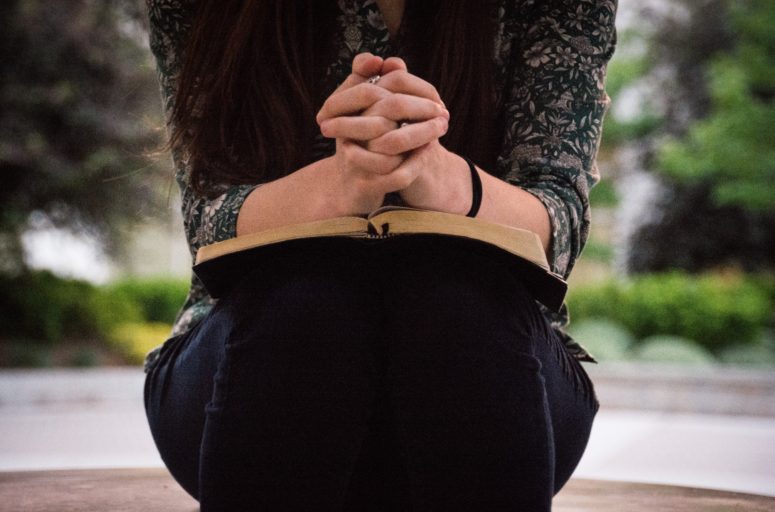Recently I was contemplating some anticipated future changes. As I thought of these things, I wondered how they might impact my kids. Change can be difficult for anyone, but it can be especially hard when your life experience is minimal and when you have little control over how the change changes things for you. As a mom, my first inclination was to try to figure out how I can minimize the potential challenges for my children. As a Christian though, I recognized that my first impulse needed to be to pray. I may think I know how my kids will react and what will be difficult for them, but I know that God knows. And unlike my kids’ mother, God can prepare their hearts and their minds, and He can use any difficulties in their lives for His good. He has far more tools at His disposal than I ever will, and He loves my kids far better than I can. It may be natural to think about what I can do to help my kids through any transition, but it is far more important and impactful for me to ask God to do so.
This incident was indicative of a larger issue. We are quick to try to figure things out on our own, and to try to consider everything that we can do to solve a problem/fix an issue/make things better for ourselves and for those we love. Yet, far too rarely, does all this pondering and thinking come after we have spent considerable time in prayer. Instead, we tend to pray, and to ask for prayer, when we feel like there is nothing else for us to do. Prayer then, isn’t our first recourse; it is our last resort.
Logically, this doesn’t make sense. After all, if I was going into brain surgery, I wouldn’t try to figure it out on my own, and then, when I couldn’t, call the medical doctor. My first step would be to talk to the individual who has far more knowledge, ability, skill, insight to help than I do. But with God, I, and I fear many others, try to do things on our own, and only petition God when we realize we are inadequate for the problem. How can we change this pattern? Here are three questions that I have found helpful:
1. Have I prayed about it more than I have thought about it?
As an introspective person, I can spend a lot of time thinking about a situation. I analyze from various perspectives and consider possible course of actions and anticipated outcomes. None of these things are necessarily bad in and of themselves. God has given us our intellect and our experiences to shape us into the person that He wants us to be. The problem arises when I want to spend all my time considering the situation from my own perspective. My perspective is necessarily limited, while God’s is not. If I try to wrestle through the situation, and then ask God for insight, I am doing myself a disservice. Instead, I need to start by seeking His perspective. I need to first ask Him about His thoughts on whatever I am facing. As Scripture teaches, His thoughts are not my thoughts (Isaiah 55:8), and I trust His omniscient insights much more than I trust my compromised perspective. And I need to act in accordance with that trust. If my time spent in prayer hasn’t surpassed the time that I have spent considering the situation, then I need to reverse course quickly. May I first seek the One who knows all things, and may I ask Him to direct my thoughts and my perspectives in accordance with His will.
2. Have I prayed about it more than I have talked about it?
If my first temptation is to try to analyze the situation rather than to pray about it, my second temptation is to seek the perspectives of others before I seek God’s. Although this is unlikely to be universally true, I find that this temptation in particular is more often than not stronger for women. We are social creatures, and we tend to rely on our relationships more than men do. While I am making that observation without a value judgment, this does create a problem if we are quicker to turn to others instead of turning to God. We should not seek God as one of our many options. He needs to be the first Person we turn to. Only after we sincerely sought after Him, should we seek the advice of others.
There are two potential errors here and I want to try to address them before I am misunderstood. First, I am not saying you can never talk to anyone else about a situation you are facing. God has called us to walk in Christ in community and the family of God has been and is one of the biggest blessings in my life. When it is needed, we should seek the help and perspective of others. But this too should be done in prayer. Not every situation needs to be discussed with every person. You may be inclined to share everything with your bestie but please be careful here. Sometimes there may be someone else that God has placed in your path that is more suited to come alongside you in a particular matter. If you believe that God is leading you to talk to someone else about a situation, talk to Him first about who you should talk to.
The second, related error, is thinking that once we have prayed about it, we are free to talk about it to whomever we want. Again, this is not wise and it is not beneficial. Be wise, be prayerful, and be purposeful. Once we share a situation with someone, we can never unshare it. And if the challenge we are facing involves someone else, then we risk compromising the relationship that they have with the person that we have confided in. It is tempting to think, “they don’t know each other, so it doesn’t matter”, and while you may be fully confident that the individuals do not know each other now, who are you to say that they will not cross paths in the future? You at least have to acknowledge it is possible and to share in such a way as to protect any current or future relationship between those individuals. Pray more. Talk less. I have never been in a situation where following this pattern has been to my harm.
3. Have I committed to trust God for the results?
When I petition God about a situation, I may be tempted to share all my concerns, and then precede to worry about what will happen next. There is certainly a benefit to pouring out our hearts to God (I Peter 5:7), but if all I do is share my thoughts without committing to trusting God for the outcome, than my prayer has not been as effectual as it ought to be. My prayer should not just be a listing of complaints and considerations; instead it should also be about me acknowledging that God is at work in a situation and He is able to do “far more abundantly” than all I have asked for or imagined (Ephesians 3:20). I need to prayerfully ask for God to be at work, and then I need to trust that He is! May I not lay things at Jesus’ feet and then upon pronouncing, “Amen,” pick them back up again! I should ask for guidance, I should follow His ways, and I should trust that He will work all things together for the good of those who love Him (Rom. 8:28).
Often when I face a situation that is uncertain, I remind myself of Proverbs 21:1 – “The king’s heart is a stream of water in the hand of the LORD; he turns in wherever he will.” Kings were the most powerful people in the ancient world and yet their riches and the armies at their command could not thwart the purposes of God. He is able to work in the lives of those who are committed to Him, and He is able to work in the lives of those who are not. So whatever situation I face, He can do more in and through it than I by myself ever will. I need to seek Him, and I need to trust Him. I should turn to Him first, and I should confidently follow where He leads.

